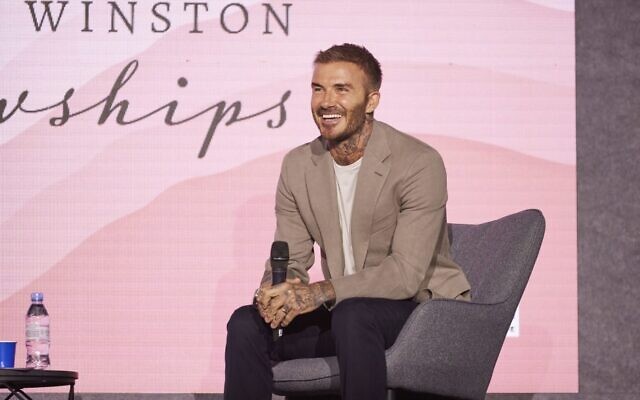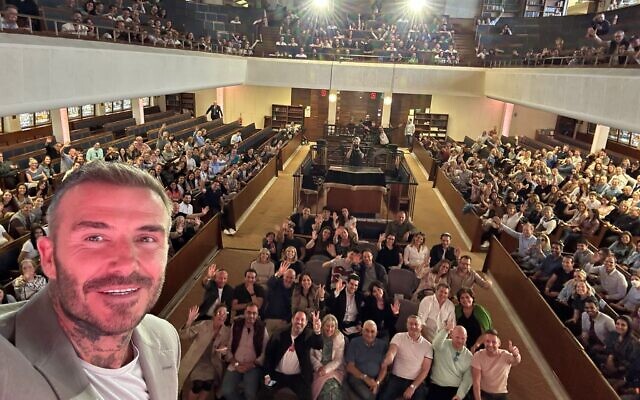‘Proud to be part of the Jewish community’
Work hard. Be humble. Go with your gut and have the right values. These were David Beckham’s lessons to the audience at ‘Lessons in Leadership’, the launch of the Lira Winston Fellowships at St John’s Wood Synagogue, London.
(Jewish News UK) – Nearly 700 people packed into the shule – not only that but they arrived early, took their seats promptly and didn’t say one word during the ‘sermon’. Move over rabbis, the way to get some decorum in your shule is to wheel in a footballing legend.
Ben Winston, who was interviewing David, kickstarted (pun intended) proceedings by offering the audience a photo op, then asked us to put our phones away so that “David will be able to speak more openly. And he can smile and look gorgeous. I’ve never felt less good-looking on a stage”.
Producer Ben and David met in 2009 when working on a Comic Relief sketch with James Corden and have been friends since. After proudly announcing that David Beckham got called up in shule, he asked the question on everyone’s lips: “How Jewish are you?”
“My grandfather was Jewish on my mum’s side. So, I do have a real connection. My grandfather always made sure that we kept up with certain traditions and whenever I used to go to bar mitzvahs and weddings, he made sure I wore a kippah. I used to see my grandma preparing the chicken soup and the matzah balls and the latkes. It was always about the family coming together so I’m part of the community, which I’m proud of.”
Ben tested David out on the bracha for bread and he finished it off perfectly in Hebrew.
He painted a warm picture of life as a young boy at home in Leytonstone with his “working class” parents, making tea for his hairdresser mum’s clients and explaining that his dad, who was a gas fitter, was a massive Man United fan.
“My dad was always pretty hard on me as a kid, and I’m glad. He’d always pick on the things I wasn’t doing right, or I didn’t do enough of. I used to probably end up in tears every time I got in the car after a game. Whether I played good or bad, he’d always tell me the things I should be doing. But when I became a professional footballer and had difficult moments, the only way I got through them was because my dad was so hard on me. And I’m thankful for that. There was so much love within our family and our family home.”
It’s no secret that David parents in a different way.
“I’ve tried to be as firm with the kids as possible but it’s nowhere near what my dad was like. I’ve only said no to my daughter once and her bottom lip started to quiver, and I was like ‘never again’. Whatever they (my kids) want to do I support them. I just want them to be happy and polite and humble.”

David’s passion for the beautiful game, and in particular for Manchester United, shone through. “Football was always the thing that I wanted to do – there was never anything else. I never wanted to play for any other English team. Ever. Manchester United was my team.”
Ben mused that the tough love David got from his father was his style of leadership.
“Alex Ferguson was a leader on and off the field,” said David. “One of the reasons why I wanted to play for Manchester United was because he was so hands on with everyone who was part of the club – the cleaning lady, the chef – he knew everyone’s first name, their siblings. He would ring my mum and dad on a Saturday evening and say, ‘how did David train this week? Is he ready for tomorrow? What time is he in bed?’”
The highs and lows of David’s football career were a big part of the evening, including the famous (if you know about these things) goal against Wimbledon when he scored from the halfway line, and launched his career.
“One of my heroes was Eric Cantona. He doesn’t say much but he came up to me after that goal and literally went ‘David, what a goal’. That was almost as good as actually scoring it. And then I came up to the Boss (Alex Ferguson) and I thought he was gonna say great, and put his arms around me but he said, ‘straight on the bus. Don’t talk to anyone.’
“But that was his way of protecting us. He knew what that goal was going to do for me, in the media, but he wouldn’t let me speak for quite a few months after that.”
A few months later he met Victoria and things exploded.
“There was a lot of attention around me, and I think Sir Alex was always worried that was going to affect me on the field. But luckily, it didn’t.”
Ben points out that David became a leader of culture – his hair would define everybody else’s hairstyle. “I wasn’t doing it for the attention,” David laughed. “The only thing I regret is all of the pictures that I’ve gotten with Nelson Mandela, I had cornrows.”
The 1998 World Cup match against Argentina when David famously got sent off and England crashed out still haunts him.
“Without doubt it still affects me. It was very tough, and the hardest thing was the impact on my family. I will never forget when my grandpa called me and said he had people knocking his door saying that I’d let the whole country down. But I’m 48 years old, a bit more experienced and I understand things a little bit more. It happened for a reason.”
Four years later he was England captain and scored the iconic goal against Greece which took the squad into the tournament. “I always wanted to play for my country. That was my biggest thing in my whole career. I wanted to wear that shirt. I wanted to play at Wembley.”
It’s rare for a British player to play abroad and yet David has played for Real Madrid, Inter Milan, LA Galaxy and PSG Paris.
“How does that feel for you as a Jewish boy from Leytonstone?” asked Ben.
“It was amazing. But in all honesty, I always felt that I would start my career at Manchester United and end my career at Manchester United. I had no intention of leaving at any point.”
David was on holiday with Victoria and the kids when he discovered that he’d been sold and would be leaving the club he loved. He manages to put a positive spin on the ‘amazing opportunities’ that working and living abroad afforded him but “I always hoped it didn’t affect my kids because that was the most important thing to me.”
What’s next for David? He’s working on a life story for Netflix and he’s excitedly anticipating Lionel Messi joining his football club in Miami.
“My dream from the word go in Miami was to bring the best players in the game to the team. So, when I hear one of the best players, if not the best player, who has won everything and is still young wants to come and play for my team, it was a massive moment. It’s still not been announced. But we are also building a new stadium so there’s a lot going on. It’s exciting times.”
David answered questions from the floor about the dangers of social media, whether he thinks standards have dropped at Manchester United (“we are still the greatest, the biggest club in the world”), how to get kids to do their school work when they’d rather be playing football (“boys – you’re always going to love football”) and, from Ben’s father, does he think the tribal nature of the game has changed: “I would like to think that that it has not – no matter where we are in the game no matter what money is bought into the game and what owners have bought into, this is the game that we all love.”


comments